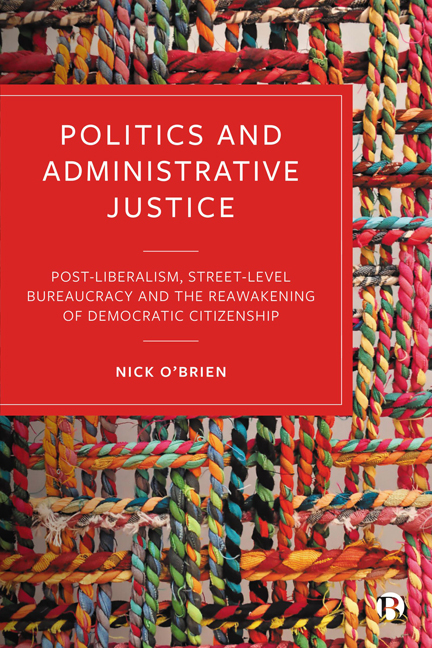 Politics and Administrative Justice
Politics and Administrative Justice Published online by Cambridge University Press: 27 March 2024
The association of contemporary liberalism with a legalistic social imaginary makes urgent the task of renewed critique in an era that is characterized as postliberal. Postliberalism as a political stance entails reacquaintance with strands of liberal thought that have slipped from prominence. In particular, it seeks to recognize the state as positive and ethical, and to situate the individual in a complex web of civic association that is a source of both identity and political agency. In the tradition of political pragmatism, it finds a function for response to citizen grievance that is primarily problem-solving and consensus-building rather than adjudicatory. Its imaginative representation, in contrast to that of the judge, resituates the virtue of justice in the company of other virtuous dispositions and as an aspect of the common good.
Postliberal democracy: ‘going on together’
Warnings of liberalism’s demise are hardly new, and indeed the concept of postliberalism by now has a significant pedigree (Gray, 1993). Various forms of communitarian, civic-republican or radical-democratic glosses on liberal themes are well established, including experiments in Third Way and Big Society politics. Indeed, the New Liberalism of L. T. Hobhouse and J. A. Hobson, which in the years before the First World War responded to the new wave of interventionist legislation by developing a positive account of liberty and of the state, might be seen as a precursor of the postliberal adaptation of classical liberalism. Yet events since the financial crash of 2008 and the global pandemic of 2020 have served severely to dent confidence in any prospect of a liberal ‘end of history’ and to intensify debate about alternative projections.
Even before the pandemic, there were insistent reports of the death of liberalism, or at least of the neoliberal form it has taken since 1979. The financial crash of 2008 represented a serious jolt to established assumptions about liberalism’s inevitable hegemony at the endpoint of history. The rising tide since then of populist and nationalist government in western states, has reinforced the suspicion that the neoliberal era of globalization has run its course and that liberal ideology itself is insufficient to meet the challenges of the moment.
To save this book to your Kindle, first ensure no-reply@cambridge.org is added to your Approved Personal Document E-mail List under your Personal Document Settings on the Manage Your Content and Devices page of your Amazon account. Then enter the ‘name’ part of your Kindle email address below. Find out more about saving to your Kindle.
Note you can select to save to either the @free.kindle.com or @kindle.com variations. ‘@free.kindle.com’ emails are free but can only be saved to your device when it is connected to wi-fi. ‘@kindle.com’ emails can be delivered even when you are not connected to wi-fi, but note that service fees apply.
Find out more about the Kindle Personal Document Service.
To save content items to your account, please confirm that you agree to abide by our usage policies. If this is the first time you use this feature, you will be asked to authorise Cambridge Core to connect with your account. Find out more about saving content to Dropbox.
To save content items to your account, please confirm that you agree to abide by our usage policies. If this is the first time you use this feature, you will be asked to authorise Cambridge Core to connect with your account. Find out more about saving content to Google Drive.